We Mustn't Pick the Flowers
unit 8 we mustn't pick the flowers

have 1、We are going to _______ (have) a dinner at Sally’s home. buy 2、I will _______ (buy) some toys tomorrow morning. go 3、She must ______ (go) to work now. are play 4、They _____ going to _____ ( play) basketball this afternoon. visit 5、The boy will _____ (visit) his grandpa this Sunday. enjoys 6、Everyone _______ ( enjoy) music. wash 7、My father is going to _____ ( wash) his car. 8、Everyone _______ ( watch) TV everyday. watches 9、you mustn’t leave _______ ( leave)you bag here.
Unit 8 We Mustn’t Pick the ’ Flowers
1.Where are they going to? They are gonging to the park for their lesson. 2.Can Jiamin leave his bag? Yes, he can. 3.What will Jiamin need? He will need his notebook and pen. 4.Can we call the kapok the Hero Tree? Yes, we can. 5.What flower is the city flower of Guangzhou? Kapok is the city flower of Guangzhou. 6.What are the tulips look like? They look like cups. 7.Why mustn’t Sally pick the flowers?
广州版五上《UNIT 8 We Mustn’t Pick the Flowers》word教案
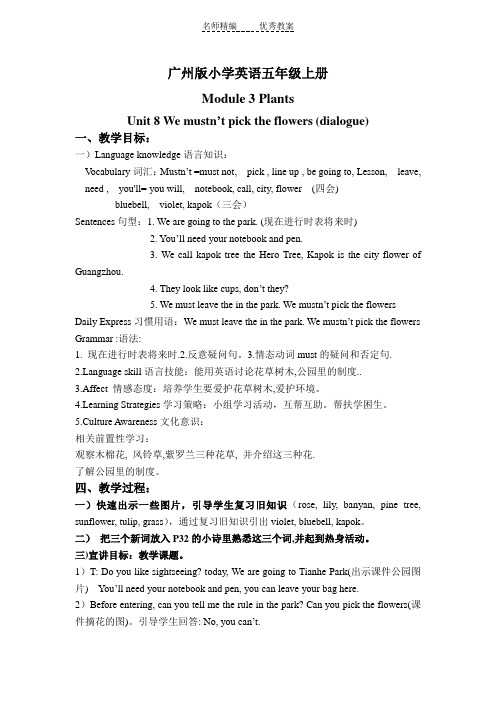
广州版小学英语五年级上册Module 3 PlantsUnit 8 We mustn’t pick the flowers(dialogue)一、教学目标:一)Language knowledge语言知识:V ocabulary词汇:Mustn’t =must not, pick , line up , be going to, Lesson, leave, need , you'll= you will, notebook, call, city, flower (四会)bluebell, violet, kapok(三会)Sentences句型:1. We are going to the park. (现在进行时表将来时)2. You’ll need your notebook and pen.3. We call kapok tree the Hero Tree, Kapok is the city flower of Guangzhou.4. They look like cups, don’t they?5. We must leave the in the park. We mustn’t pick the flowers Daily Express习惯用语:We must leave the in the park. We mustn’t pick the flowers Grammar :语法:1. 现在进行时表将来时.2.反意疑问句。
3.情态动词must的疑问和否定句.nguage skill语言技能:能用英语讨论花草树木,公园里的制度..3.Affect 情感态度:培养学生要爱护花草树木,爱护环境。
4.Learning Strategies学习策略:小组学习活动,互帮互助。
帮扶学困生。
5.Culture Awareness文化意识:相关前置性学习:观察木棉花, 风铃草,紫罗兰三种花草, 并介绍这三种花.了解公园里的制度。
广州版小学英语五年级上课文
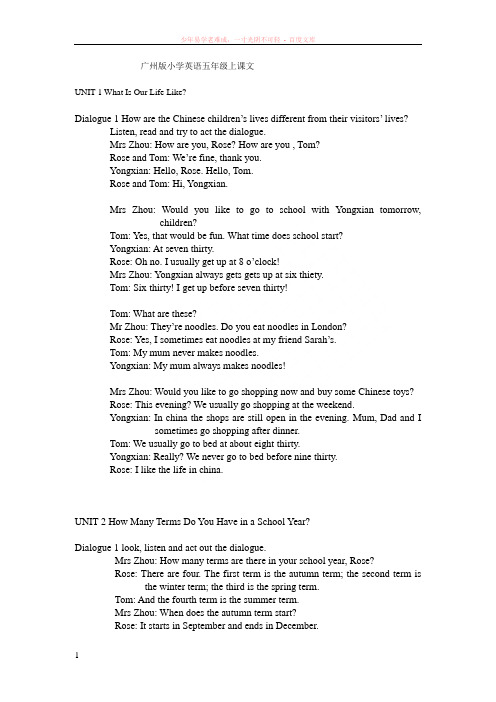
广州版小学英语五年级上课文UNIT 1 What Is Our Life Like?Dialogue 1 How are the Chinese children’s lives different from their visitors’ lives?Listen, read and try to act the dialogue.Mrs Zhou: How are you, Rose? How are you , Tom?Rose and Tom: We’re fine, thank you.Yongxian: Hello, Rose. Hello, Tom.Rose and Tom: Hi, Yongxian.Mrs Zhou: Would you like to go to school with Yongxian tomorrow, children?Tom: Yes, that would be fun. What time does school start?Yongxian: At seven thirty.Rose: Oh no. I usually get up at 8 o’clock!Mrs Zhou: Yongxian always gets gets up at six thiety.Tom: Six thirty! I get up before seven thirty!Tom: What are these?Mr Zhou: They’re noodles. Do you eat noodles in London?Rose: Yes, I sometimes eat noodles at my friend Sarah’s.Tom: My mum never makes noodles.Yongxian: My mum always makes noodles!Mrs Zhou: Would you like to go shopping now and buy some Chinese toys?Rose: This evening? We usually go shopping at the weekend.Yongxian: In china the shops are still open in the evening. Mum, Dad and I sometimes go shopping after dinner.Tom: We usually go to bed at about eight thirty.Yongxian: Really? We never go to bed before nine thirty.Rose: I like the life in china.UNIT 2 How Many Terms Do You Have in a School Year?Dialogue 1 look, listen and act out the dialogue.Mrs Zhou: How many terms are there in your school year, Rose?Rose: There are four. The first term is the autumn term; the second term is the winter term; the third is the spring term.Tom: And the fourth term is the summer term.Mrs Zhou: When does the autumn term start?Rose: It starts in September and ends in December.Mts Zhou: What about the winter term?Rose: It starts in January and ends in April.Mrs Zhou: Does your spring term begin in May?Rose: Yes. And it ends in July.Mrs Zhou: So your summer term starts in July and in September. Right?Tom: Yes, Rose and I like the summer term best. We are always on holiday in summer terms.Mrs Zhou: And now you are on your holiday in Guangzhou.Rose: Yes, we are.UNIT 4 What Can They Do?Dialogue 1 look and listen. Then read and act in groups.Kangaroo: I can jump very high and very far. Can you jump?Frog: Yes, I can, but not very high.Turtle: I can’t jump.Turtle: I can’t jump, but I can swim.Frog: I can’t jump and I can swim. I can swim very fast.Kangaroo: I can’t swim.Boy: I can swim and I can run.Bird: I can’t swim, but I can fly very high.Boy: Everyone has his own gift.UNIT 5 What Can the Robot Do?Dialogue 1 look and listen. Then read and act in groups.Jiamin: Look. Sally. Is that a man?Sally: No, it’s a robot.Robot: Hello! My name’s Rob.Sally: The robot can speak English!Jiamin: Hello, Rob, can you talk with us?Robot: Yes, I can.Ben: can you walk?Robot: Yes, I can walk with my legs.Ben: Can you run?Robot: No, I can’t.Sally: can you work?Robot: Yes, I can work with my hands.Jiamin: What else can you do?Robot: I can tell stories in English. And I can sing and dance. Watch me!Children: You can sing and dance very well!UNIT 7 Let’s Go to the Flower ShowDialogue 1 look and listen. Then read and act in groups.Mum: it’s a lovely day. Let’s go to the flower show.Ben: Can I go with you?Mum: Yes,of cours.Ben: Can I talk the camera?Mum: Of course you can.Janet: Can I talk photos of flowers?Mum: sure!Janet: Look, Xiaoling is sitting on the grass under the big banyan tree. Xiaoling, what are you doing there?Xiaoling: I’m taking a rest.Janet: Can you help us take o photo?Xiaoling: Sure! Are you ready?Janet: Yes.Xiaoling: OK.Janet: Thanks.UNIT 8 We Mustn’t Pick the FlowersDialogue 1 look and listen. Then read and answer the question.Mr Chen: Line up, everyone! We’re going to the park for our lesson today!Children: Great!Jiamin: Can I leave my bag here?Mr Chen: Yes, but you’ll need your notebook and pen.Mr Chen: what’s that tree over there? Do you know?Ben: is it a banyan tree?Mr Chen: No, it’s a kapok tree.Xiaoling: And we call it the Hero Tree.Yongxian: Kapok is the city flower of Guangzhou.Janet: I see.Mr Chen: What are those flowers?Janet: I know! They’re tulips. They look like cups, don’t they?Mr Chen: Yes, they do. They grow in spring.Ben: Oh! Look at those lovely bluebells!Xiaoling: They are not bluebells. I think they’re violets.Sally: My mum loves violets. Can I pick some violets for my mum?Mr Chen: No, Sally, we can’t pick them. Everyone likes flowers. We must leave them in the park.Jiamin: Yes, so everyone can enjoy them.Sally: Oh, you’re right. We mustn’t pick the flowersUNIT 10 Where Are You Going on HolidayDidlogue 1 look and listen. Then read and act in groupsMiss White: Tomorrow is the start of the school holiday, children. Where are you going on holiday,Xiaoling?Xiaoling: I’m going to America, Miss White.Miss White: That’s fantastic, Xiaoling. How are you going to get there?Xiaoling: By plane, of course.Miss White: Where are you going on holiday, Youngxiao?Yongxxian: I'm going to Hong Kong tomorrow.Miss White: That's super,Yongxiao. How are you going to get there?Yongxian: I'm going by train.Miss White: I'm goint to Hong Kong tomorrow too. What time is your train going toleave for Hong Kong?Yongxian: At half past seven in the morning.What about yours?Miss White: At a quarter to ten.Miss White: Where are you going on holiday,Wang Lili?Wang Lili: I'm going to Xiamen tomorrow.Miss White: That's good. How are you going to get there?Wang Lili: I'm going by ship.Miss White: When will you get there?Wang Lili: At about four o'clock the next afternoon.Miss White: Where ate you going on holiday,Jiamin?Jiamin: I'm going to stay with my grandmother.Miss White: That's nice,Jiamin.How are you going to get there?Jiamin: I'm going on foot.She lives near my home.Unit 11 How are you going there?Dialogue 1 Look and listen.Then read and act in groups.Mr Chen: Jiamin, what are you going to do on your holiday with your grandmother?Jiamin: On Monday I'm going to Xiangjiang Zoo in Panyu. We’re going to see the white tigers.Mr Chen: That's good. How are you going there?Jiamin: By bus.Mr Chen: What are you going to do on Tuesday?Jinmin: On Tuesday and Wednesday we're going to stay in Shenzhen. We're going tovisit the Window of the World.Mr Chen: How are you going there.Jiamin: By train.Mr Chen: What about Thursday?Jiamin: We're going to Foshan by car for a day trip.Mr Chen: Who's going to drive?Jiamin: Uncle Ming.Mr Chen: Are you going home on Friday?Jiamin: Yes.We're going to visit Guangzhou Art Museum.Mr Chen: How are you going to get home after that?Jiamin: On foot.Mr Chen: What about Saturday and Sunday?Jiamin: We're going to stay at home.UNIT 13 They Are Going to the ZooDialogue 1 look ang listen. Then read and act in groups.Xiaoling: Janet, do you like animals?Janet: Yes, I do. My favourite animal is the panda.Xiaoling: Would you like to come to the zoo tomorrow with my family?Janet: Yes, thanks. That would be gread.Janet: We can take some food to feed the animals too.Xiaoling: But Mum always says “don’t feed the animdls in the zoo!”Xiaoling: See you tomorrow at the gate of the zoo at half past nine. Don’t forget! And don’t be late, please!Janet: OK. See you tomorrow!UNIT 14 They Are Visiting the ZooDialogue 1 look and listen. Then read and act in groups.第一段Xiaoling: Look at the monkeys!they’re running and jumping. They are funny!Janet: They are lovely, but don’t give them your banana!Xiaoling: hy not?Janet: It’s the zoo rule!第二段Janet: Look at the lion! It is strong and dangerous!Xiaoling: It is beautiful, but don’t go too near!Janet: Where is the lion from?Xiaoling: It’s from Africa.Janet: Can a lion kill a tiger?Xiaoling: Who knows?UNIT 16 Could You Tell Me the Way to the Zoo?Dialogue 1 look ang listen. Then read and act in groups.1.Tourist: Excuse me. Could you tell me the way to Guangzhou Zoo,please?2.Mr Chen: Sorry?3.Tourist: Could you tell me the way to Guangzhou Zoo, please?4.Jiamin: Yes. Turn right out of the hotel. Go straight ahead and take the first left.5.Tourist: OK. Turn right out of the hotel and then go straight ahead and take the firstleft.6.Jiamin: Right.7.Tourist: is the zoo on the right or on the left?8.Jiamin: It’s on the right. You can see it.9.tourist: By the way, is the Night Zoo near here?10.Jiamin: No. it’s in Panyu. You can take a No.26 bus to get there.11.Tourist: Thank you very much.12.13.Jiamin: You’re welcome.UNIT 17 Where Is the School Canteen?jiamin: Excuse me. I’m going to meet a friend. Could you tell me how to get to thecanteen, please?Puoil1: Yes. Turn right here and take the first left. Go straight ahead and take the third right.Jiamin: First left, straight ahead and third left.Pupil 1: No, third right.Jiamin: OK. Third right, straight ahead and third left.Pupil 1: No, come back!Jiamin: Excuse me, I’m lost. Could you tell me how to get to the canteen?Pupil 2: Yes. Go straight ahead and talk the first right, and then take the second right and the canteen is on you right.Jiamin: Thank you.第二段Jiamin: Excuse me, I’m lost. Could you tell me how to get to the canteen?Teacher: Of coure. Go straight ahead. Take the third and the canteen is on your right.Jiamin: that’s easy. Straight on, third right and the canteen is on the right.第三段Jiamin: Hi, Sally. Where’s Mike、Sally: Hello, Jiamin. Mike is at the gym. You are late.Jiamin: Oh no! How do I get to the gym.。
人教精通版五年级英语下册教案Unit 3 We should obey the rules Lesson 17教案

Unit 3 We should obey the rules.Lesson 17教案【教学重点】能够使用do, don't, should, shouldn't, must, mustn't提醒、劝告别人遵守各种规则。
【教学难点】1. 运用所学的句子熟练对话。
以日常交流为基础,让学生掌握英语语言,并在听说读写的训练中学到主动的语言,启发学生的英语思维能力2. 使用must告诫别人“必须做某事”,使用mustn't警告别人“一定不要做某事”。
【教具准备】1.准备本课的教学挂图及录音磁带和投影片。
可将教学挂图进行剪贴处理,先呈现大街的景象,再呈现人物。
2.如果条件允许,可以由学生或教师先抓拍一些与本课内容有关的照片。
3.结合本课教学需要,准备歌曲Traffic light的录音。
4. 本单元课件。
呈现新课(Presentation)1.导入Talk about your home rule.通过上节课的学习,学生已经初步掌握一些home rule. 可以邀请学生说一说自己的home rule.1)以小组接龙的形式进行英文版《小学生守则》的复述比赛。
评选优胜小组和最佳个人。
2)学唱歌曲Traffic light,并通过歌曲将学生引入本课的语言教学。
2. 教学步骤1)教师拿出事先准备好的照片,或者使用本课的教学挂图、投影片,呈现情景。
让学生观察图片中的各种行为是否符合社会行为规范。
教师提出问题让学生思考:What is he / she doing? Is he / she right or wrong? If you see him / her, what will you do?2)学生分组讨论图片情景,对其中人物的行为进行辨别。
3)让每组选出一两个学生发言,其他学生提供帮助。
4)当学生回答If you see him / her, what will you do? 这个问题时,说You should .... You shouldn't ... 的时候,教师首先肯定学生的回答,重复一遍,接着用must和mustn't再说一遍。
常见情态动词讲解
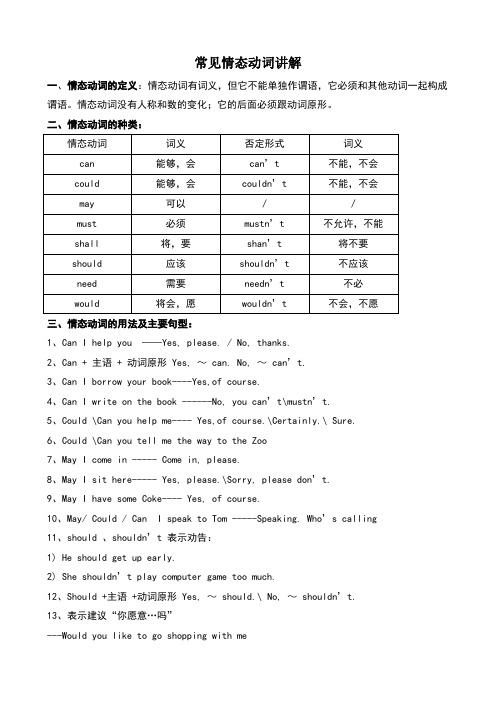
常见情态动词讲解一、情态动词的定义:情态动词有词义,但它不能单独作谓语,它必须和其他动词一起构成谓语。
情态动词没有人称和数的变化;它的后面必须跟动词原形。
二、情态动词的种类:三、情态动词的用法及主要句型:1、Can I help you ——Yes, please. / No, thanks.2、Can + 主语 + 动词原形 Yes, ~ can. No, ~can’t.3、Can I borrow your book----Yes,of course.4、Can I write on the book ------No, you can’t\mustn’t.5、Could \Can you help me---- Yes,of course.\Certainly.\ Sure.6、Could \Can you tell me the way to the Zoo7、May I come in ----- Come in, please.8、May I sit here----- Yes, please.\Sorry, please don’t.9、May I have some Coke---- Yes, of course.10、May/ Could / Can I speak to Tom -----Speaking. Who’s calling11、should 、shouldn’t 表示劝告:1) He should get up early.2) She shouldn’t play computer game too much.12、Should +主语 +动词原形 Yes, ~ should.\ No, ~shouldn’t.13、表示建议“你愿意…吗”---Would you like to go shopping with me---Yes, I’d love to. /I’d love to. But I’m busy now.14、就餐用语Would you like something to eat\drink ----Yes, I’d like…15、shall用于第一人称(I, we), 可以表示“将”和表示建议“……好吗”1) Where shall we have dinner2) Shall we go fishing -----All right. \OK. \Good idea.16、Must + 主语 + 动词原形 ---Yes,~ must.\No, ~needn’t.四.常见情态动词的区别:1. can (could)1)表示能力,could主要指过去时间。
广州版五年级英语上册课件 Module 3 Unit 8 We mustn’t pick the flowers
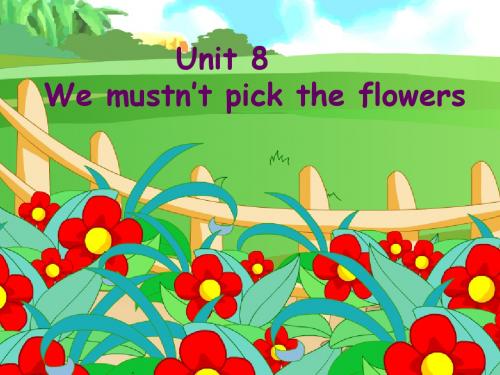
Kapok is the city flower of Guangzhou.
木棉是广州的市花。 We call it the Hero Tree. 我们把它叫做英雄花。
bluebell风铃草
They look like cups, don’t they? 他们看起来像杯子,不是吗? Yes , they do.
We mustn’t pick the flowers.
• Everyone likes flowers. • We must leave them in the park. • Everyone can enjoy them.
mustn’t是must的否定形式, 表示不允许、不应该,语 气比can’t更为强烈,用法 与can,can’t,must相同, 后跟动词原形。
pick flowers ride a bike climb trees sit on the grass listen to the radio take a walk sleep on the bench do some reading
• What’s your favorite flower? • ----Sunflower. • What’s your favorite tree? • ----Kapok tree.
Unit 8 We mustn’t pick the flowers
It’s a lovely day. 今天天气真好!
Let’s go to the park! 让我们去公园吧!
park 公园
lesson 课
We are going to the park for our lesson today! 我们今天准备去公园上我们的课!
人教新版 英语六年级上册 第一单元中文翻译
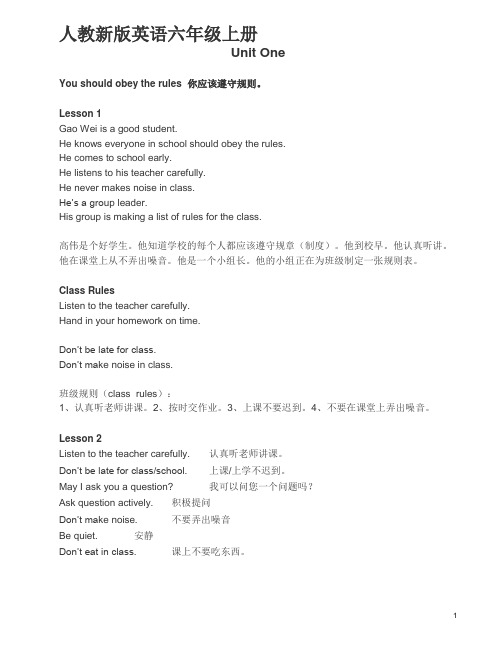
人教新版英语六年级上册Unit OneYou should obey the rules 你应该遵守规则。
Lesson 1Gao Wei is a good student.He knows everyone in school should obey the rules.He comes to school early.He listens to his teacher carefully.He never makes noise in class.He’s a gro up leader.His group is making a list of rules for the class.高伟是个好学生。
他知道学校的每个人都应该遵守规章(制度)。
他到校早。
他认真听讲。
他在课堂上从不弄出噪音。
他是一个小组长。
他的小组正在为班级制定一张规则表。
Class RulesListen to the teacher carefully.Hand in your homework on time.Don’t be late for class.Don’t ma ke noise in class.班级规则(class rules):1、认真听老师讲课。
2、按时交作业。
3、上课不要迟到。
4、不要在课堂上弄出噪音。
Lesson 2Listen to the teacher carefully. 认真听老师讲课。
Don’t be late for class/school.上课/上学不迟到。
May I ask you a question? 我可以问您一个问题吗?Ask question actively. 积极提问Don’t ma ke noise. 不要弄出噪音Be quiet. 安静Don’t eat in class. 课上不要吃东西。
Peter is a good student at school. But sometimes he is not a good boy at home. He often makes a mess in his room. He doesn’t like to help to set the dinner table. He watches TV the wh ole evening. He reads in bed and he goes to bed very late. Peter’s mother writes some home rules for him:Home RulesYou should:1. Help to set the dinner table2. Go to bed early.3. Keep your room clean.You shouldn’t:1. Read in bed.2. Watch TV till late.3. Make a mess in your room.彼得在学校里是一个好学生。
2024届北京市海淀区地实验小学五年级英语第二学期期末经典试题含解析

2024届北京市海淀区地实验小学五年级英语第二学期期末经典试题(时间:90分钟分数:100分)学校_______ 班级_______ 姓名_______一、单项选择(每题2分,共20分)。
1.________, let’s glue the paper. ( )A. OneB. LastC. Lastly2.Let’s _________ to the museum. ( )A. wentB. goingC. go3.—Whose storybooks are these, Pedro? ( )—______.A. It's over thereB. They're Tim'sC. At 1:30 p.m.4.—_________ is the dinner at your birthday party? ( )—It’s so yummy. All my friends enjoy it.A. WhatB. WhereC. How5.I will enjoy __________ visit in Shanxi. ( )A. IB. meC. my6.I usually get up _______ 6:00 _______ the morning. ( )A. at; atB. in; atC. at; in7.I often go ______ in summer. ( )A. swimB. swimsC. swimming8.I like winter best. Because ________. ( )A. I can pick applesB. I can go swimmingC. I can make a snowman9.Dongdong is going to read some _____. ( )A. booksB. storyC. play10.—_____ ( )—I like spring best.A. What month is it?B. When is your birthday?C. Which season do you like best?二、读单词,选出不同类的一项(每题2分,共10分)。
Unit8We Mustn't Pick the Flowers
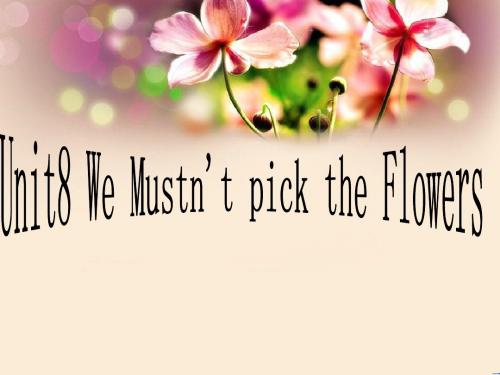
木棉树
pine tree
• Can you tell us the national flower of China/Japan/Britain? • 你能告诉我们中国、日本、和英国的国花 吗?
be(am、is、are) going to… 准备、打算做~~~~ I am going to …
You are going to …
学习目标
一.掌握“四会”单词:mustn’t=must not, pick, line, line up, be going to, park, lesson, leave, need, you’ll=you will, notebook, call, city, city flower. 二.掌握句型: 1.We’re going to… 2.-They look like…don’t they? -Yes, they do. 3.Everyone likes flower. 4.We must/mustn’t+动词原形(表示向别人敦促和 命令) 三.语法:1.一般将来时的用法(be going to) 四.能理解并流利跟读课文。
1.We mustn’t climb the trees.我们不应该爬树。 2.They mustn’t sit on the grass.他们不应该坐在草 地上。 3.You mustn’t talk in the class.你们不允许在课堂 上讲话。
It’Байду номын сангаас a lovely day!
Let’s go to the park. 公园
tree 树
banyan 榕树
pine tree
松树
kapok tree
木棉树
广州版小学英语五年级上词汇短语默写练习参考答案

广州版小学英语五年级上词汇短语默写练习参考答案Module One: Routines and Dates 日常活动和日期Unit 1: What is our life like? 我们的生活是怎样的?1. 表示频度的副词:(参见课本P5~6)从来不:never有时:sometimes经常:often通常:usually总是:always相当经常:quite often2. 日常活动:起床:get up刷牙:brush teeth吃早餐:have/eat breakfast去上学:go to school回家:go home吃午饭:have/eat lunch做作业:do homework吃晚饭:have/eat dinner/supper上床睡觉:go to bed3. 其他活动:吃面条:eat noodles喝咖啡:drink coffee煮面条:make / cook noodles去购物:go shopping买一些玩具:buy some toys看电视:watch TV上网:surf the net参观博物馆:visit the museum去散步:go for a walk去少年宫:go to the Children’s Palace做锻炼:take exercise听收音机:listen to the radio去慢跑:go jogging扫地:sweep the floor拖地:mop the floor去游泳:go swimming看故事书:read story book跳高:high jump做饭:cook读些书:do some reading玩电脑游戏:play computer game踢足球:play football打篮球:play basketball喝果汁:drink juice吃米饭:eat riceUnit 2: How many terms do you have in a school year? 你在一个学年里有多少个学期?1. 序数词:ordinal number(参见课本P10)第一:first第二:second第三:third第四:fourth第五:fifty第六:sixth第七:seventh第八:eighth第九:ninth第十:tenth第十一:eleventh第十二:twelfth第十三:thirteenth第十四:fourteenth第十五:fifteenth第十六:sixteenth第十七:seventeenth第十八:eighteenth第十九:nineteenth第二十:twentieth第二十一:twenty-first第二十二:twenty-second第二十三:twenty-third第二十四:twenty-fourth第二十五:twenty-fifth第二十六:twenty-sixth第二十七:twenty-seventh第二十八:twenty-eighth第二十九:twenty-ninth第三十:thirtieth第三十一:thirty-first2. 月份:month日期:date一月:January二月:February三月:March四月:April五月:May六月:June七月:July八月:August九月:September十月:October十一月:November十二月:December3. 季节:season春天:spring夏天:summer秋天:autumn冬天:winterUnit 3: Let’s go further节日:holiday, festival(参见课本P13~14)春节:Spring Festival / Chinese New Year儿童节:Children’s Day教师节:Teachers’ Day国庆节:National Day of the PRC妇女节:Women’s Day劳动节:May Day建党节:The Birthday of the CCP建军节:Army Day in China圣诞节:Christmas Day新年:New Year愚人节:April Fool’s Day感恩节:Thanksgiving Day复活节:Easter万圣节:Halloween母亲节:Mother’s Day父亲节:Father’s Day生日:birthday我妈妈的生日:my mother’s birthdayModule Two: Abilities 能力Unit 4: What can they do? 他们会做什么?1. 动物:animals(参见课本P17)袋鼠:kangaroo / kangaroos小鸟:bird / birds鹅:goose / geese鱼:fish兔子:rabbit / rabbits猫:cat / cats狗:dog / dogs鸭子:duck / ducks青蛙:frog / frogs鸡:chicken / chickens猴子:monkey / monkeys马:horse / horses2. 动作:actions(参见课本P17~19)飞得高:fly high跳得高:jump high游得快:swim fast跑得快:run fast爬树:climb trees读书写字:read and write唱歌:sing跳舞:dance走路:walk游泳:swim跑得很快:run very fast跳得很高:jump very high飞:fly爬山:climb the hill跳得很远:jump very farUnit 5: What can the robot do? 那个机器人会做什么?(参见课本P21~22)说英语:speak English与我们谈话:talk with us用他的双腿走路:walk with his legs用他的双手工作:work with his hands用英语讲故事:tell stories in English唱歌跳舞:sing and dance跑步:run明白你的老师:understand your teacher骑车:ride a bike从一数到一百:count from one to one hundred用英语给你的朋友写一封信:write a letter in English to your friend3. 程度副词:(参见课本P24)非常好:very well不错:well相当好:quite well不是很好:not very well一点儿都不好:not at allUnit 6: Let’s go further (参见课本P26~28)玩捉迷藏游戏:play hide-and-seek看见你的耳朵:see your ears在老师的桌子下:under the teacher’s desk看见你的脚:see your feet在门的后面:behind the door看见你的鼻子:see your nose在椅子后面:behind the chair看见你的尾巴:see your tail在窗户边:at the window在课室外面:outside the classroom玩冰棍球:play ice-hockey打太极拳:do Taiji打棒球:play base-ball打美式足球:play American football跳芭蕾舞:dance ballet弹钢琴:play the piano朗诵诗歌:recite a poem做侧手翻:do cartwheels跳水,潜水:diveModule Three: Plants 植物Unit 7: Let’s go to the flower show. 我们一起去看画展吧。
小学五年级英语Unit8Wemustn’tpicktheflowers
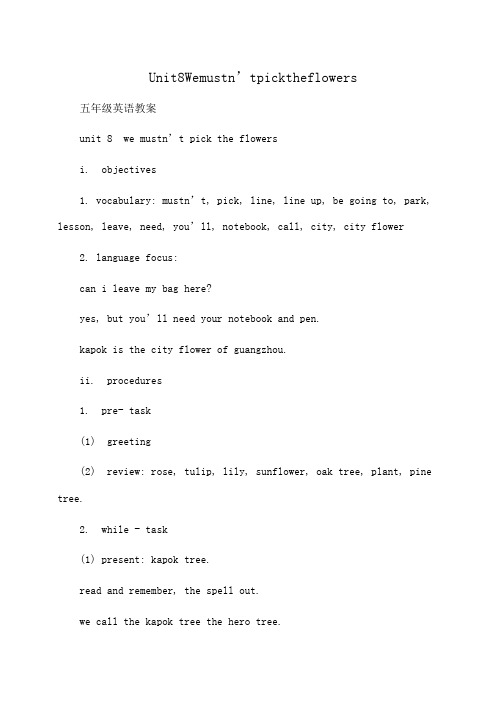
Unit8Wemustn’tpicktheflowers五年级英语教案unit 8 we mustn’t pick the flowersi. objectives1. vocabulary: mustn’t, pick, line, line up, be going to, park, lesson, leave, need, you’ll, notebook, call, city, city flower2. language focus:can i leave my bag here?yes, but you’ll need your notebook and pen.kapok is the city flower of guangzhou.ii. procedures1. pre- task(1) greeting(2) review: rose, tulip, lily, sunflower, oak tree, plant, pine tree.2. while - task(1) present: kapok tree.read and remember, the spell out.we call the kapok tree the hero tree.kapok is the __(city flower) of guangzhou.(2)t: do you like to go to the __(park)?do you like to have a __(lesson) in the park?yes, we’re __(going to ) the park for our lesson.you can __(leave) your bag on the grass.but __(you`ll need) your __(notebook) and pen(3) read and remember the new words.practise: be going to you`ll = you willwe`re going to take photos.he is going to take a rest.you`ll need some tools.they will water the flowers.sally will go to the park.(4) whole class read all the new words.(5) listen to the dialogue and find out which words you don`t know:mustn`t = must not line up pickdistinguish: mustn`t can`t(6) listen again and answer the questionwhat are we going to do?what will the children need?is there an oak tree over there?what tree is it?why mustn’t we pick the flowers?(7) read the dialogue after the tape(8) read in groups3. post - tasklook at the key words, try to retell the dialogue. homework:1. listen, read the dialogue.2. copy the new words and dialogue.layoutbe going to kapok treewe are going to take photos city floweri am going to plant trees callhe is going to take a rest parkyou`ll = you will leave leavesyou`ll need some tools needthey`ll water the flowers notebooksally will go to the park line upmodule 4 travelⅰ.objectivesnguage skill(1) can talk about traveling.五年级英语教案(3) can talk about how to get to some places.2. language knowledge(1) vocabulary4 skills:get (to), by, train, leave for, half, past, half past seven, yours, quarter, a quarter to ten, stay, on foot, live, travel, underground, zoo, tiger, window of the world, night, night zoo, road3 skills:fantastic, hong kong, super, trip, for a day trip, centre, shopping centre,(2)drillsi’m/ you’re/ he’s/ she’s/ they’re going to the usa.are you going to stay there?he’s not going to get there by bus.how are you going to get there?where are you going on holiday?when will get there?that’s fantastic/ great/ super!(3) sub-topicunit 10: where are you going on holiday? unit 11: are you going there?unit 12: let’s go further3. affects(1) to have fun and memo ability.(2) to increase pupils’ sense of rhythm.(3) to encourage pupils to think.(4) to challenge more able learners.4. learning strategy(1) cognitive strategy.(2) regulating strategy.。
牛津上海版六年级英语上册Unit 7 rules around us
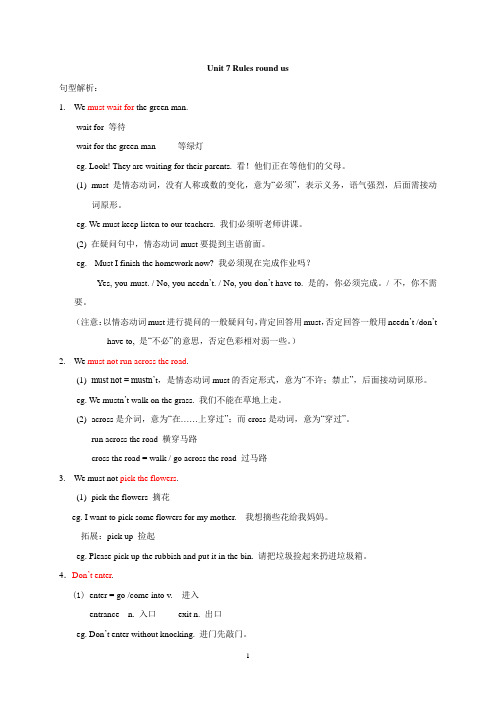
Unit 7 Rules round us句型解析:1.We must wait for the green man.wait for 等待wait for the green man 等绿灯eg. Look! They are waiting for their parents. 看!他们正在等他们的父母。
(1)must是情态动词,没有人称或数的变化,意为“必须”,表示义务,语气强烈,后面需接动词原形。
eg. We must keep listen to our teachers. 我们必须听老师讲课。
(2) 在疑问句中,情态动词must要提到主语前面。
eg. --Must I finish the homework now? 我必须现在完成作业吗?--Yes, you must. / No, you needn’t. / No, you don’t have to. 是的,你必须完成。
/ 不,你不需要。
(注意:以情态动词must进行提问的一般疑问句,肯定回答用must,否定回答一般用needn’t /don’t have to, 是“不必”的意思,否定色彩相对弱一些。
)2.We must not run across the road.(1)must not = mustn’t,是情态动词must的否定形式,意为“不许;禁止”,后面接动词原形。
eg. We mustn’t walk on the grass. 我们不能在草地上走。
(2)across是介词,意为“在……上穿过”;而cross是动词,意为“穿过”。
run across the road 横穿马路cross the road = walk / go across the road 过马路3.We must not pick the flowers.(1)pick the flowers 摘花eg. I want to pick some flowers for my mother. 我想摘些花给我妈妈。
人教精通版五年级英语下册-Unit 3达标检测卷附答案

人教精通版五年级英语下册Unit 3达标检测卷时间:40分钟满分:100分题号一二三四五六七八九十十一十二总分得分听力部分(30分)一、听录音,选择你所听句中含有的词汇。
(5分)()1. A. answer B. ask C. think()2. A. make B. late C. wait()3. A. people B. children C. classmate()4. A. go home B. get up C. go to bed()5. A. play on the street B. keep off the grass C. pick flowers二、听录音,给下列图片排序。
(5分)()()()()()三、听录音,判断下列句子与短文内容是否相符,相符写“T”,不相符写“F”。
(10分)()1. Betty knows everyone in school should obey the rules.()2. Betty doesn't come to school late.()3. Betty's group isn't making a list of rules for the class.()4. Betty never makes noise in class.()5. Betty doesn't hand in homework on time.四、听录音,补全短文。
(10分)Lucy is a good student at school. And she is also a good girl at 1. ____________. She often helps her mother to 2. ____________ 3. ____________. But her brother Tom isn't a good boy. He often goes to bed 4. ______________. And he doesn't always keep his room clean. So we should say to him ,"Don't 5. ____________ a mess in your room. You must keep it clean. "笔试部分 (70分)五、看图,圈出正确的单词或短语。
人教精通版五年级英语下册-Unit 3 We should obey the rules Lesson 18 教案

Unit 3 We should obey the rules.人教精通版五年级英语下册-Lesson 18教案【教学重点】能够使用do, don't, should, shouldn't, must, mustn't提醒、劝告别人遵守各种规则。
【教学难点】1. Enable to listen, say and read new word : respect, street, littering, sign.2. Enable to say sentence patterns: You must... You mustn’t...3. Enable to read, listen, say and write : look out, wait, must, good.Look out! You must wait.4. Can express the public rules and understand the meaning of the signs in public.【教学目标】Ability aims:To develop the students of listening, speaking, reading and writing.Can express the public rules and understand the meaning of the signs in public.Emotion aims:To develop the students’ interests in English.To obey the rules in different places.【教具准备】1.准备本课的教学挂图及录音磁带和投影片。
可将教学挂图进行剪贴处理,先呈现大街的景象,再呈现人物。
2.如果条件允许,可以由学生或教师先抓拍一些与本课内容有关的照片。
3.结合本课教学需要,准备歌曲Traffic light的录音。
六年级英语植物保护重要性单选题50题
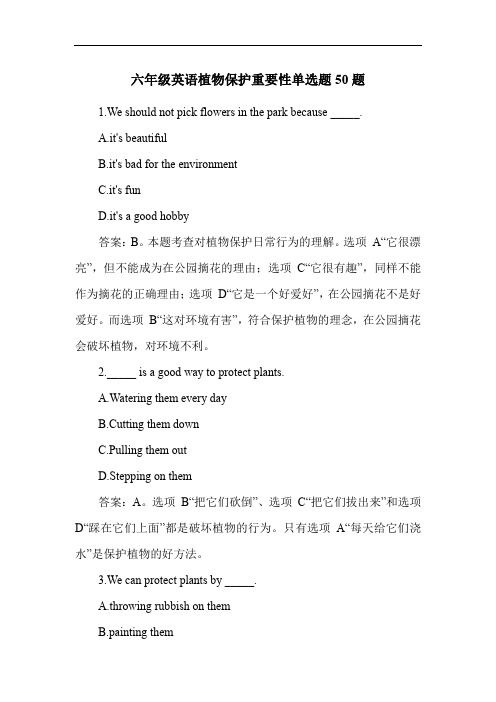
六年级英语植物保护重要性单选题50题1.We should not pick flowers in the park because _____.A.it's beautifulB.it's bad for the environmentC.it's funD.it's a good hobby答案:B。
本题考查对植物保护日常行为的理解。
选项A“它很漂亮”,但不能成为在公园摘花的理由;选项C“它很有趣”,同样不能作为摘花的正确理由;选项D“它是一个好爱好”,在公园摘花不是好爱好。
而选项B“这对环境有害”,符合保护植物的理念,在公园摘花会破坏植物,对环境不利。
2._____ is a good way to protect plants.A.Watering them every dayB.Cutting them downC.Pulling them outD.Stepping on them答案:A。
选项B“把它们砍倒”、选项C“把它们拔出来”和选项D“踩在它们上面”都是破坏植物的行为。
只有选项A“每天给它们浇水”是保护植物的好方法。
3.We can protect plants by _____.A.throwing rubbish on themB.painting themC.planting more treesD.picking their leaves答案:C。
选项A“把垃圾扔在它们上面”、选项D“摘它们的叶子”都是伤害植物的行为。
选项B“给它们涂上颜色”也不是保护植物的正确方式。
而选项C“种更多的树”可以增加植物数量,是保护植物的方法。
4.Don't _____ the grass. It's important for the environment.A.walk onB.waterC.cutD.paint答案:A。
选项B“浇水”是保护草的行为;选项C“割”和选项D“涂”都是错误的行为。
2024年六年级英语植物保护措施单选题30题
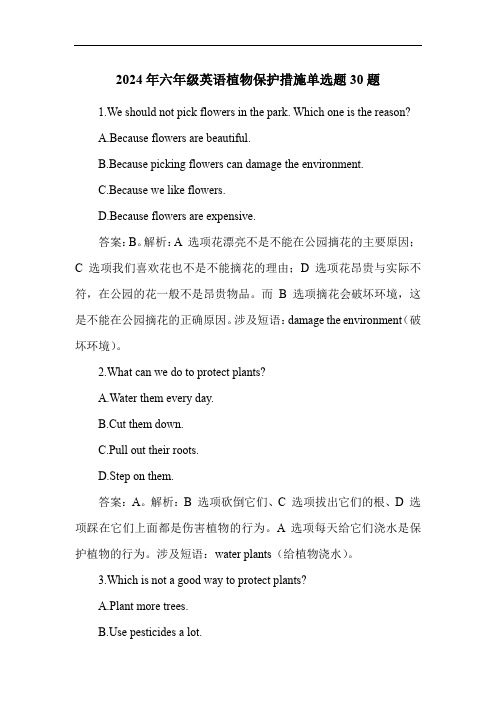
2024年六年级英语植物保护措施单选题30题1.We should not pick flowers in the park. Which one is the reason?A.Because flowers are beautiful.B.Because picking flowers can damage the environment.C.Because we like flowers.D.Because flowers are expensive.答案:B。
解析:A 选项花漂亮不是不能在公园摘花的主要原因;C 选项我们喜欢花也不是不能摘花的理由;D 选项花昂贵与实际不符,在公园的花一般不是昂贵物品。
而B 选项摘花会破坏环境,这是不能在公园摘花的正确原因。
涉及短语:damage the environment( 破坏环境)。
2.What can we do to protect plants?A.Water them every day.B.Cut them down.C.Pull out their roots.D.Step on them.答案:A。
解析:B 选项砍倒它们、C 选项拔出它们的根、D 选项踩在它们上面都是伤害植物的行为。
A 选项每天给它们浇水是保护植物的行为。
涉及短语:water plants 给植物浇水)。
3.Which is not a good way to protect plants?A.Plant more trees.e pesticides a lot.C.Make a birdhouse for birds.D.Don't litter in the garden.答案:B。
解析:A 选项种更多的树是保护植物的好方法;C 选项为鸟儿做一个鸟屋,鸟儿可以帮助保护植物;D 选项不在花园里乱扔垃圾也是保护植物的方式。
而B 选项大量使用农药会对植物造成伤害。
摘花的英语短语
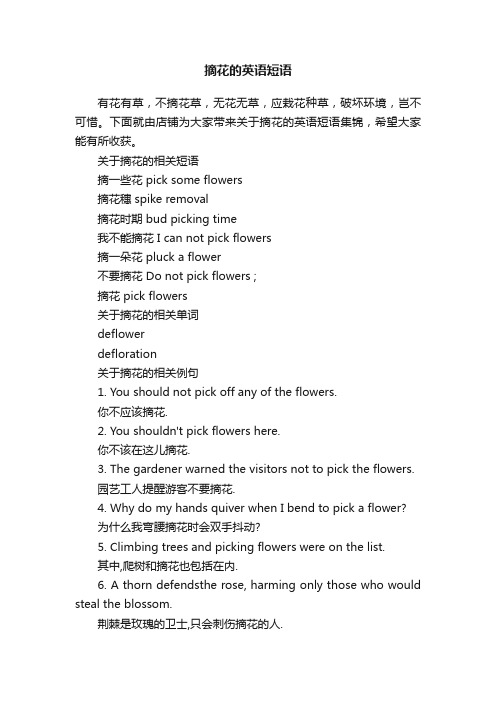
摘花的英语短语有花有草,不摘花草,无花无草,应栽花种草,破坏环境,岂不可惜。
下面就由店铺为大家带来关于摘花的英语短语集锦,希望大家能有所收获。
关于摘花的相关短语摘一些花 pick some flowers摘花穗 spike removal摘花时期 bud picking time我不能摘花 I can not pick flowers摘一朵花 pluck a flower不要摘花 Do not pick flowers ;摘花 pick flowers关于摘花的相关单词deflowerdefloration关于摘花的相关例句1. You should not pick off any of the flowers.你不应该摘花.2. You shouldn't pick flowers here.你不该在这儿摘花.3. The gardener warned the visitors not to pick the flowers.园艺工人提醒游客不要摘花.4. Why do my hands quiver when I bend to pick a flower?为什么我弯腰摘花时会双手抖动?5. Climbing trees and picking flowers were on the list.其中,爬树和摘花也包括在内.6. A thorn defendsthe rose, harming only those who would steal the blossom.荆棘是玫瑰的卫士,只会刺伤摘花的人.7. The rose has thorns only for those who would pluck it.玫瑰花的刺仅仅是为摘花人准备的.8. He climbed down the bank to pick flowers.他爬下河堤去摘花.9. We must n't pick flowers in the park.我们禁止在公园里摘花.10. They asked the boy not to pick flowers.他们叫那个男孩不要摘花.11. We picked flowers in the garden.我们在花园里摘花.12. We catch butterflies, we pick flowers, and we pick wild fruit to eat.有时候,我们会森林捉蝴蝶、摘花、摘野果吃.13. Pickers are bent double, plucking each flower with lightning speed.采花人弓着身子飞快地摘着花。
- 1、下载文档前请自行甄别文档内容的完整性,平台不提供额外的编辑、内容补充、找答案等附加服务。
- 2、"仅部分预览"的文档,不可在线预览部分如存在完整性等问题,可反馈申请退款(可完整预览的文档不适用该条件!)。
- 3、如文档侵犯您的权益,请联系客服反馈,我们会尽快为您处理(人工客服工作时间:9:00-18:30)。
Unit 8 We Mustn't Pick the Flowers (第一课时)
一、教学内容:We mustn't pick the flowers.
二、教学重、难点:
1、Words: mustn't =must not pick line up be going to lesson leave need you'll= you will notebook
kapok call city flower bluebell violet
2、 Structure: We're going to …...
You'll …..
We mustn't pick the flowers.
三、教学目标:
1、认识更多的植物的名称。
2、能用英语表达自己的计划即会用句子:
3、能理解对话、流利的朗读对话。
四、教学步骤:
(一)Warming up
Rhyme
(二)Leading--in
1、 Free talk
What day is it today?
What date is it today?
What are you doing?
Can you …?
Can I …?
2 、从Can I ….引入学习单词leave line up
3 Ask the students to tell the names of some flowers.
(三)Presentation and practice
1、学习句型We're going to ….. 和单词lesson you'll need notebook
T: There are many beautiful flowers in the park. So we're going to the park for our lesson, OK ?(课件呈现课文)2、呈现植物kapok tree bluebells violets等图片学习植物的
名称.
3、Tell the students kapok is the city flower of GuangZhou and we call it the hero tree.
4、进行环保教育。
T: I like the flowers very much .Do you like them ? Ps: Yes, I do.
T: Can we pick the flowers in the park?
Ps: No, we can't.
T: Yes, you're right. Everyone likes flowers .We must leave them in the park .So everyone can enjoy them .So we mustn't pick the flowers.
5、 Learn the new words : must n’t pick.
6 、 Pupils learn and practice the sentences :
We must leave them in the park.
Everyone can enjoy them.
We mustn't pick the flowers.
(三)Development:
1 、 Ask the students to look ,listen and read the dialogue.
2 、Ask the students to act out the dialogue .
3 、 Do some exercise.
(四)Homework :
1 、Read the new words and dialogue in the group.
2 、 Copy the new words and dialogue.。
